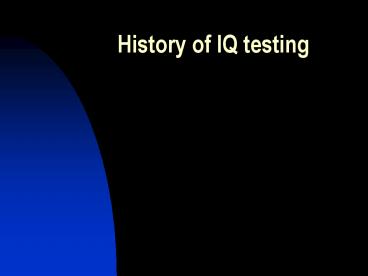History of IQ testing - PowerPoint PPT Presentation
1 / 24
Title:
History of IQ testing
Description:
The other 3 index scores & the Performance IQ tend to have ... Marilyn Monroe 163. Mahatma Gandhi 160. Richard Nixon 143. Charlie Chaplin 140. Bill Clinton 140 ... – PowerPoint PPT presentation
Number of Views:190
Avg rating:3.0/5.0
Title: History of IQ testing
1
History of IQ testing
2
History of IQ testing
- Before IQ Testing Began
- Francis Galton (1822-1911)
- The Early IQ
- Alfred Binet (1857-1911)
- Charles Spearman (1863-1945)
- Henry Goddard (1865-1957)
- Lewis Terman (1877-1956)
3
History of IQ Testing
- Testing in the Military
- Terman, Goddard and Yates
- 1937 Revision
- Other Theories
- David Wechsler
- Howard Gardner and Multiple Intelligence
4
History of IQ testing
- The Modern IQ test
- 1960 Revision
- 1972 Revision
- 1986 Revision
5
What do the Scores Mean?
- Intelligence Interval
- 40-55
- 55-70
- 70-85
- 85-115
- 115-130
- 130-145
- 145-160
- 160
- Cognitive Designation
- Mentally Disabled (less than 1)
- Learning Difficulty (2.3)
- Below Average
- Average (68 )
- Gifted
- Genius (2.3 )
- Extraordinary Genius (less than 1)
- Unmeasurable Genius
6
Reliability
- Intelligence tests are very controversial
- Reliability vs. Validity
- Modern Intelligence tests are quite reliable
- Reliability often measured by administering
similar forms of a test on 2 occasions
7
Reliability
- WAIS-III
- Internal Test-Retest reliabilities of the full
scale verbal IQs average about .95 or higher - The other 3 index scores the Performance IQ
tend to have somewhat lower reliabilities,
averaging about .90 - Generally, reliabilities for performance
- subtests are lower than for verbal subtests
- Stanford-Binet fourth edition
- Reliability of Composite score is very high
- Various estimates being in the mid- .90s
- Area scores are generally reliable, subtests have
problematic reliabilities
8
Valid Uses of Adult IQ Tests
9
Validity Review
- Validity Defined Agreement between a test score
and the quality it is believed to measure - Does an IQ test actually give us a valid measure
or prediction of a certain variable?
10
Valid and Non-Valid Uses of IQ Testing in Adults
- When is IQ testing in Adults used correctly?
- When do we overstate the uses of IQ?
11
Valid Uses of IQ Testing in Adults
- Recent Study
- IQ scores correlation to other Cognitive tests
- Entire Spectrum of Intelligence
- Scholastic Problems
- Has shown to predict job success better than
random selection. - 1939 New York City Police Force
- Follow up testing
- Individuals with Disabilities
- Research
12
When do we Overstate the Uses of Adult IQ?
- What IQ really measures
- Certain Abilities
- Does it Predict Job or Economic Success?
- Higher IQ more Success
- Other variables held constant
- Same IQ score
- Different Socioeconomic background
- Different levels of schooling
13
When do we Overstate the Uses of Adult IQ?
- Does it Predict Job or Economic Success?
(continued) - Manager Observations
- Higher IQ more advanced skills?
- Job Success
- First few months higher IQ outperforms
- 4 or 5 years
14
Valid Uses of IQ Testing in Adults
- Be careful what we give IQ credit for.
- Do Not jump to conclusions
- IQ cannot predict beyond what it is actually
testing
15
Test Bias
- If the misery of our poor be caused not by the
laws of nature, but by our institutions, great is
our sin. Darwin
16
Early Testing Bias
- Craniometry- Paul Broca
- Used in the 19th century to rank races by brain
size. - What craniometry was for the 19th century,
intelligence testing is for the 20th century. - It assumes that intelligence is a single, innate,
heritable, and measurable thing.
17
Stanford Binet
- Binet rejected the hereditarian interpretation
and only wanted to use the test as a device to
identify children in need of special help. - Binet refused to define his scores as
intellegence. - Original test was too language dependent.
18
H.H. Goddard
- H.H. Goddard- First to use and interpret Binets
scale in America. - Goddard misinterprets.
- Unilinear scale of intelligence.
- Feeble mindedness.
- High grade defectives.
- Morons
19
What is Intelligence?
- No two definitions are the same
- Culture
- Stanford-Binet today
20
Nurture vs Nature
- What causes variation in intelligence?
- Nurture camp
- Nature camp
- Zeitgeist Pendulum
- Herrstein and Murray
- Interaction between genetics and environment
21
Further Reading
- Gould, S.J. The Mismeasure of Man.
- Ridley, M. Nature via Nurture
22
Famous IQs
- Leonardo da Vinci 220 OR 190 OR 180
- William Shakespeare 190
- Albert Einstein 190 OR 160
- Plato 180 OR 170
- Napoleon 180 OR 145
- Pablo Picasso 175
- Bill Gates 173 OR 160
23
Famous IQs
- Confucius 170
- Norman Schwarzkopf 170
- Marilyn Monroe 163
- Mahatma Gandhi 160
- Richard Nixon 143
- Charlie Chaplin 140
- Bill Clinton 140
24
Famous IQs
- Paul Hogan 140
- Madonna 140
- Shakira 140
- Arnold Schwarzenegger 135
- Nicole Kidman 132
- Walt Disney 123
- Average person 90 to 110
- Koko the trained gorilla 90
- George Bush 91































